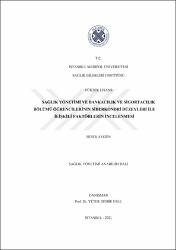Sağlık Yönetimi ve Bankacılık ve Sigortacılık Bölümü öğrencilerinin siberkondri düzeyleri ile ilişkili faktörlerin incelenmesi
Künye
Aygün, S. (2021). Sağlık Yönetimi ve Bankacılık ve Sigortacılık Bölümü öğrencilerinin siberkondri düzeyleri ile ilişkili faktörlerin incelenmesi. (Yayınlanmamış yüksek lisans tezi). İstanbul Medipol Üniversitesi Sağlık Bilimleri Enstitüsü, İstanbul.Özet
İnternet kullanımının arttığı günümüzde, internet aracılığı ile tekrarlanan sağlık bilgisi aramalarının da artması neticesinde sağlık anksiyetesinin şiddetlenmesi "siberkondri" olarak tanımlanmaktadır. Bu çalışma; Sağlık Yönetimi Bölümü öğrencileri ile Bankacılık ve Sigortacılık Bölümü öğrencilerine Siberkondri Ciddiyet Ölçeği (SCÖ) ve sosyo-demografik soru formlarından oluşan anketin uygulanması ve sonuçlarının karşılaştırılması ile sağlık eğitimi alma durumunun siberkondri düzeyini etkileyip etkilemediğini ortaya koymak amacıyla yapılmıştır. Çalışma kesitsel ve tanımlayıcı yöntem ile gerçekleştirilmiştir. Çalışmanın evreni; İstanbul'daki bir vakıf üniversitesinde eğitim gören 400 Sağlık Yönetimi Bölümü öğrencisi ve 200 Bankacılık ve Sigortacılık Bölümü öğrencisi olmak üzere toplam 600 öğrenciden; örneklemi ise 316 Sağlık Yönetimi Bölümü Öğrencisi ve 102 Bankacılık ve Sigortacılık Bölümü öğrensici olmak üzere toplam 418 öğrenciden oluşmaktadır. Çalışmanın güvenirliği Cronbach's Alfa analizi ile yapılmış ve katsayısı 0,903 çıkmıştır. Katılımcıların siberkondri düzeyleri arasında istatistiksel olarak anlamlı farklılık olup olmadığını tespit etmek için; T Testi, Tek Yönlü Varyans (ANOVA) Analizi ve non parametrik testler (Mann-Whitney U testi ve Kruskal Wallis testi) kullanılmıştır. Farklılık analizlerinde SCÖ açısından "internet doktorlar kadar bilgili", "doktor sonrası araştırma" ve "internetten hastalık hakkında bilgi arama" değişkenlerinde istatistiksel olarak anlamlı farklılık bulunmuştur. İnterneti doktorlar kadar bilgili bulanların bulmayanlara göre, doktor sonrası araştırma yapanların yapmayanlara göre ve internetten hastalık hakkında bilgi arayanların aramayanlara göre SCÖ ortalamaları daha yüksek saptanmıştır. Katılımcıların internet kullanımı ve bölümleri arasında yapılan analizlerde anlamlı farklılık elde edilemese de günde 4-5 saat internet kullananların daha az kullananlara göre ve sağlık eğitimi almayanların alanlara göre SCÖ puanları daha yüksek olduğu tespit edilmiştir. Çalışmada, sağlık eğitimi alma durumu istatistiksel olarak anlamlı farklılık göstermese de siberkondri düzeyinin düşürülmesinde etkili olduğu sonucuna ulaşılmıştır. In today's world in which internet use is increasing, "cyberchondria" is defined as the aggravation of health anxiety as a result of the increase in repeated searches for medical knowledge via the internet. This study has been conducted in order to reveal whether the case of receiving health education affects the level of cyberchondria by applying the questionnaire consisting of sociodemographic question forms and Cyberchondria Severity Scale (CSS) to the students of the Department of Health Management and Department of Banking and Insurance with the comparison of the results. The study was carried out with a cross-sectional and descriptive method. The target population of the study comprises of a total of 600 students, 400 of whom are from the Department of Health Management and 200 of whom are from the Banking and Insurance Department studying at a foundation university in Istanbul. Its sample consists of 418 students, 316 of whom are from the Department of Health Management and 102 of whom are from Banking and Insurance Department. When determining the reliability of the study, Cronbach's Alpha analysis was performed and the coefficient was found to be 0.903. In an attempt to determine whether there is a statistically significant difference between the cyberchondria levels of the participants, T Test, One Way Variance (ANOVA) Analysis and nonparametric tests (Mann-Whitney U test and Kruskal Wallis test) were used. In the analysis of differences, a statistically significant difference was found in the variables of "The internet is as knowledgeable as doctors", "The research after visiting the doctor" and "Searching for information about the disease on the internet" in terms of CSS. Those who find the internet as knowledgeable as doctors have been found to have a higher average CSS than those who do not, while those who do research after visiting the doctor have been found to have a higher average CSS than those who do not. On the other hand, the CSS averages of those who search for information about the disease on the internet were higher than those who do not. Although any significant difference was not found in the analysis of the internet usage and the departments of the participants, CCS scores of those who use the internet for 4-5 hours a day were higher than those who use the internet less and the ones of those who do not receive health education were higher than who receive health education. In the study, it was concluded that although the case of receiving health education did not show a statistically significant difference, it was effective in reducing the level of cyberchondria.
Koleksiyonlar
- Tez Koleksiyonu [1159]


















